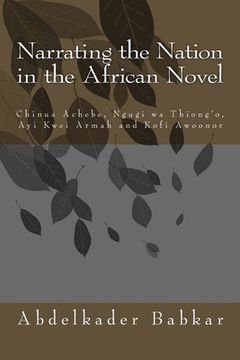Narrating the Nation in the African Novel: Chinua Achebe, Ngugi wa Thiong'o, Ayi Kwei Armah and Kofi Awoonor (en Inglés)
Reseña del libro "Narrating the Nation in the African Novel: Chinua Achebe, Ngugi wa Thiong'o, Ayi Kwei Armah and Kofi Awoonor (en Inglés)"
The idea of the nation or nationalism in relation to Africa and African literature has been widely dealt with in modern African literature, arising from the fact that writers are bent on expressing their concern about the future of their countries. Chinua Achebe, Ayi Kwei Armah, Ngugi wa Thiong'o and Kofi Awoonor are such writers who have made great artistic efforts to portray an Afrotopia, or at best viable socio-political systems in the wake of colonial situation. The present work aims to examine closely these novelists' ideological convictions as they are expressed in their fictions and often shown to be in opposition to the practices established by the state apparatuses in place. This book shows how the African situation has been characterised in the African novels by both a common continental experience and a number of facts that dramatise the historical predicament of slavery, colonialism and a problematic independence. These representations carry dialogical voices which underpin the authoritative voice of the authors. The narratives of the nation are shown to be ambivalent, for they seem to act in defence of the novelists' culture, yet they jettison its very quintessence by the sceptical view they reflect about its significance in modern times. Caught between the imperatives of modernity and the nostalgic drives of the past, the novelists are somehow drawn to condemn the metropolis and to celebrate it at the same time. The point is to accept the construction of the nation-state in connection with universal concepts developed by the Western world and Europe essentially. The different 'utopias' offered by the writers under scrutiny cannot be divorced from the theory and practice that have led to the construction of European models of nation-states. Hence our reliance on important scholarly works in the field, particularly Elie Kedourie's Nationalism, Eric Hobsbawm's Nations and Nationalism Since 1780, Ernest Gellner's Nations and Nationalsim. But for the theoretical link between nationalism and literary interpretation, Benedict Anderson's Imagined Communities, Homi Bhabha's Nation and Narration and The Location of Culture, Edward Said's Orientalism and Culture and Imperialism and Bakhtin's The dialogical Imagination are fundamental supports for my discussion. Critics that have approached this subject are restrictive in number, but I have taken account of the studies carried out by James Ogude on Ngugi, Leif Lorentzon on Armah, for example, or general works like Abiola Irele's The African Experience in Literature and Ideology or Kanneh Kadiatu's African Identities, amongst others, to substantiate the discussion Due appreciation of the different styles used by the writers is expressed here from a modernism used by early Armah and Awoonor, to the realism of Achebe and Marxist-populist treatment of fiction and nation-building of Ngugi, as well as the essentialist slant that can be studied in Armah's later fiction. Concepts such as hybridity, ambivalence, liminality, developed by Bhabha, are useful elements of analysis in the examination of the evolution of prose fiction in Africa from the early writings of Achebe to the later works of Armah and Ngugi. They allow us to see how the African novelists produce meanings that underscore the realities and difficulties met in the construction of stable and genuinely independent nation-states in Africa.

